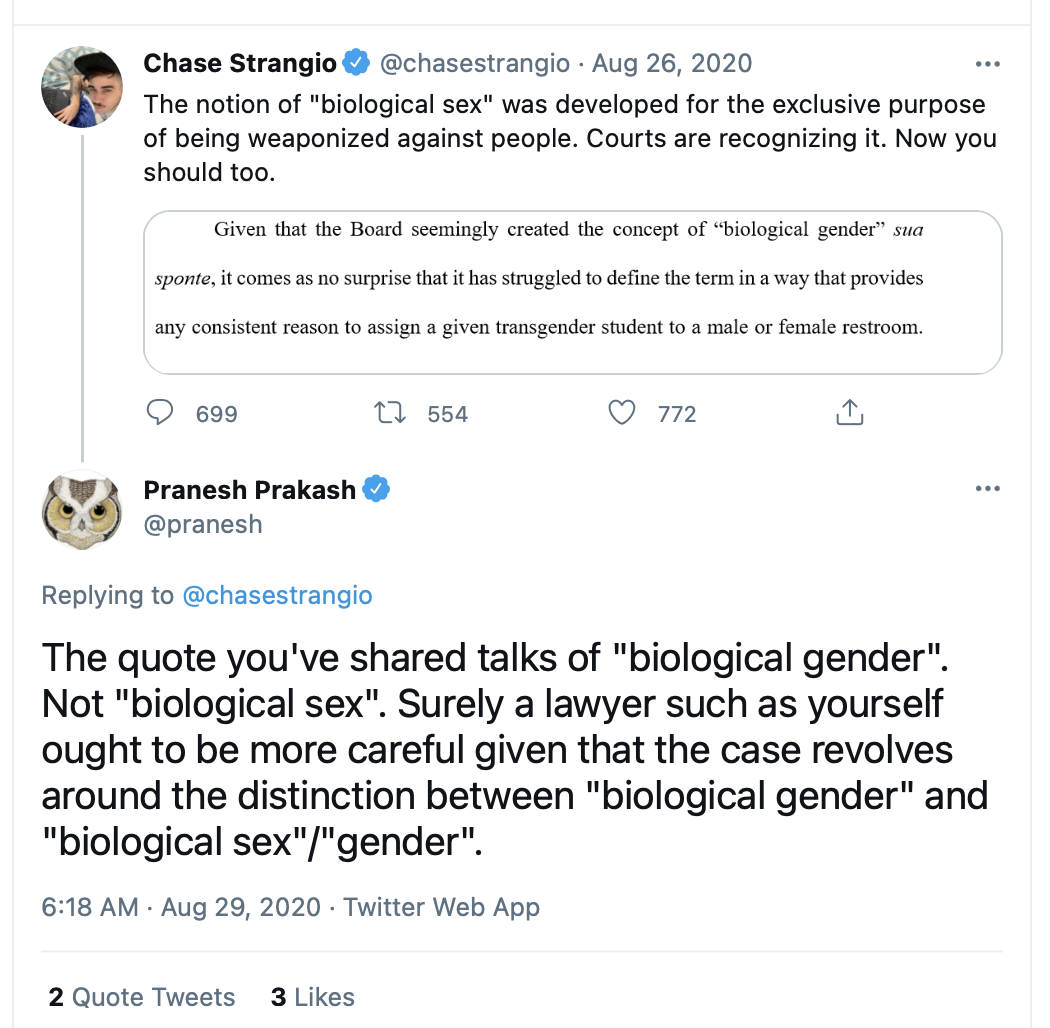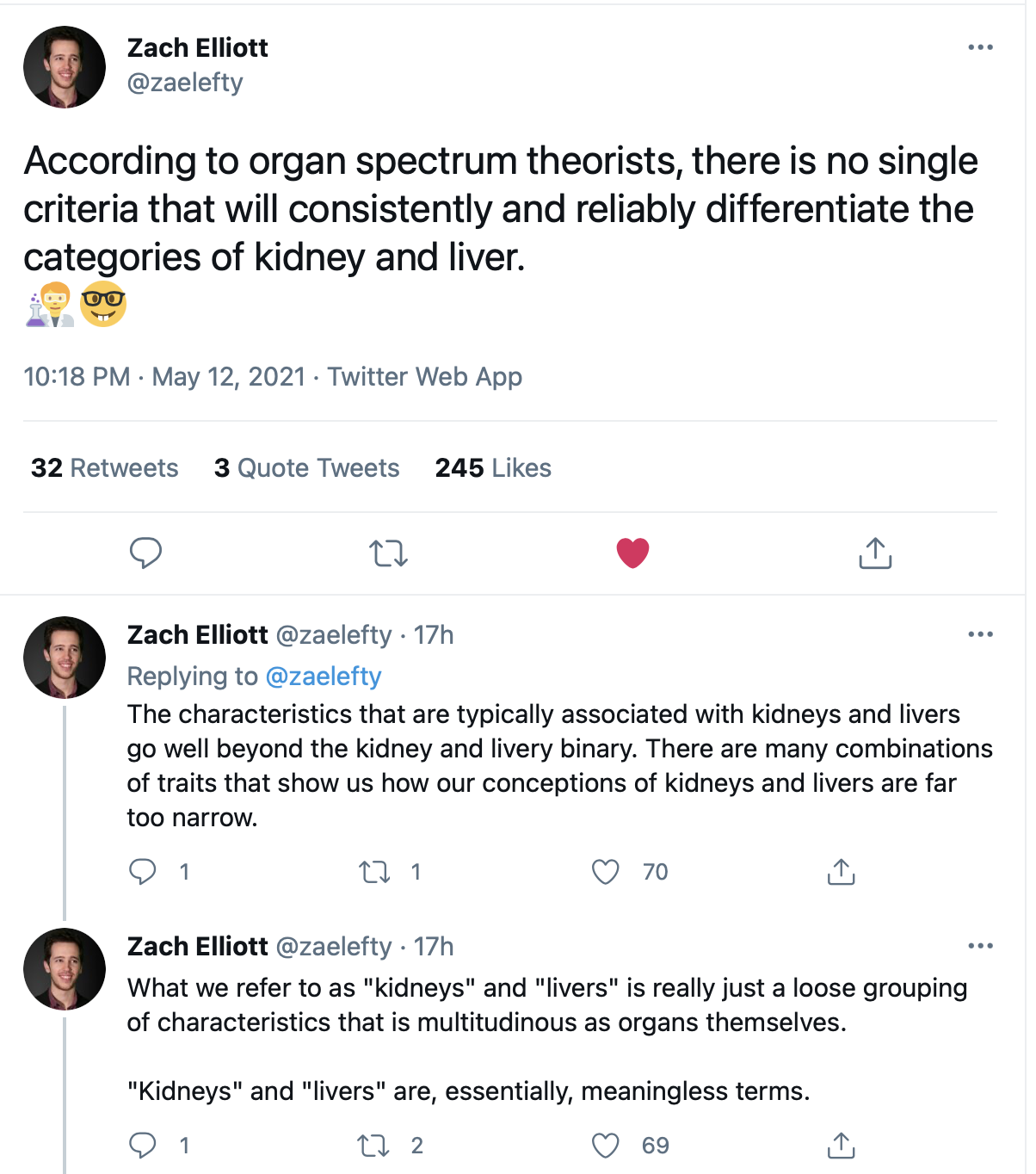Colin Wright Warns of the Danger Posed by Innocuous-Seeming Requests for “Pronouns”
I have no business telling any adult what to do with his or her body. That is their own business. It's a different story with children. We need to make sure that our children (and their parents) are not being given false information that leads to irreversible physical damage to their bodies (cross-sex hormones and surgeries), in many cases leading to sterility. There are real cases of gender dysphoria but, historically speaking, they have been rare (1/10,000) and they have overwhelmingly been boys. Today, almost 2% of teenagers are claiming to be transgender and they are overwhelmingly girls who tend to fall into social clusters, which would not be expected if dysphoria were truly a medical condition.
What is going on and why should be be concerned? Much of the left-leaning news media cheerleads for those who promote gender ideology and totally ignore the numerous and growing cases of those teenagers who detransitioned--who permanently altered their bodies, often through double mastectomies then, years later, declared that they were, indeed, the sex aligning with their chromosomes, their gametes and their sex organs readily apparent at birth. It's not rocket science to figure out the sex of most people (intersex cases are extremely rare). These stories by numerous detransitioners are extremely difficult to read. They are stories of deep regret, stories of how these teenagers got caught up in a fad encouraged by their peers, and enabled by well-meaning activist school teachers and counselors, as well as almost instant access to cross-sex hormones, often at Planned Parenthood. The parents are often concerned that they must allow their children to transition based on commonly touted but false statistics and unsubstantiated claims that suicide is the only other option.
Biologist Colin Wright recently wrote "How to Make a Trans Kid." It is well-written and accurate upon my own extensive readings. I recommend reading Wright's entire article. Here is an excerpt:
Most people understand the terms “man” and “boy” refer to adult and adolescent human males, respectively, and that “woman” and “girl” refer to adult and adolescent human females, respectively. These are not “identities,” but terms that describe objective facts about one’s age and biological sex.
Gender ideology, conversely, is a belief system asserting that what makes someone a woman or a girl, or a man or a boy, has nothing whatsoever to do with their sex, but is based entirely on the social roles and stereotypes with which they “identify.” Therefore, a person who identifies with feminine roles and stereotypes is a girl or woman, and a person who identifies with masculine roles and stereotypes is a boy or man—regardless of their biological sex. According to gender ideology, people who do not identify with the social roles and stereotypes typically associated with their sex are considered “transgender.”
That’s Gender Ideology 101. If it comes across as completely insane, that’s because it is.
Gender ideology has therefore proven to be a hard sell for many adults who rightfully view such ideas as regressive and sexist. After all, this worldview entails that a woman who does not fully embrace femininity is not actually a woman, and a man who does not embrace masculinity is not actually a man. If this sounds similar to the regressive and oppressive system that women’s and other human rights groups fought for decades to overcome, that’s because it is. But it’s actually much worse, since it also promotes the idea that a “mismatch” between one’s sex and “gender identity” can be medically “corrected” with hormones and surgeries.
[More . . . ]
The Vindication of Abigail Shrier
Abigail Shrier has taken a lot of heat for sharing well-documented information and raising important questions about transgender treatment and therapy. For example:
Abigail Shrier’s book Irreversible Damage has created quite a stir. When it was first released in June 2020, Amazon refused to allow the publisher to run sponsored advertisements of the book. After Joe Rogan interviewed Shrier on his podcast, some Spotify employees demanded that the episode be taken down. More recently, Target took the book off its shelves in response to a complaint from a person on Twitter, but later put it back due to other complaints from free speech advocates. Several others have declared the book to be transphobic and harmful to the trans* community (just skim some of the reviews on Amazon)—a particularly hot take among those who have not read the book.
A few days ago, Shrier published an article discussing interviews she has conducted with two well credentialed experts. Shrier's expressed motive is to help families with teenagers who are struggling with how to proceed. Shrier's interviews vindicated many of the points she made in her previous writings, including her book, Irreversible Damage. Here is an excerpt from "Why Marci Matters: Dr. Marci Bowers’ and Dr. Erica Anderson’s Candor Could Help Thousands of Families":
On Monday, I published probably the most important piece of my career thus far: an interview I did with two top gender medical providers – vaginoplasty expert and gender surgeon Dr. Marci Bowers and child psychologist at the UCSF gender clinic, Dr. Erica Anderson, who spoke candidly about risks of current treatment protocols guiding transgender medicine.For the first time in the U.S., top gender medical providers collectively acknowledged four facts: early puberty blockade can lead to significant surgical complication and also permanent sexual dysfunction; peer and social media influence do seem to play a role in encouraging the current, unprecedented spike in transgender identification by teen girls; and the World Professional Association of Transgender Health (WPATH) – of which both Bowers Anderson are board members – has been excluding doctors who question current medical protocols to its detriment.
But the bombshell – the point made to me in interviews with so many endocrinologists, but never by any providers of transgender medicine – was that “orgasmic naïveté” is real and it’s a problem.
In Bowers’ words:
When you block puberty, the problem is that a lot of the kids are orgasmically naive. So in other words, if you've never had an orgasm pre-surgery and then your puberty's blocked, it's very difficult to achieve that afterwards. And I think that I consider that a big problem, actually. It's kind of an overlooked problem that in our informed consent of children undergoing puberty blockers, we've in some respects overlooked that a little bit.
Transgender Logic: A Kidney is the Same Thing as a Liver
Elliot's "argument" is satirical, aimed at claims commonly being made by transgender activists. Elliot cites to some of these claims in his tweet thread. Another person making this claim that biology is merely socially constructed is Chase Strangio, one of the lead attorneys for the ACLU, which, once-upon-a-time used to be a principled organization, but has now become unapologetically partisan on many issues.

The problem for Strangio, et al is that biological sex came into existence two billion years before the existence of hominids. That said, basic biological facts don't seem to matter to trans activists like Strangio.
Ninth Circuit Court of Appeals to Decide Who Qualifies as a “Woman” Athlete in Idaho
Is a particular person was a "woman"? For most of my life, everyone I knew would say that the question is answered by considering what kind of genitals that person had. For many people, the answer to that question is no longer answered purely by biology. And to make the discussion all-the-more confusing, transgender activists insist that "intersex" conditions are relevant to this discussion while others consider intersex a red herring.
Lindsay Hecox v Bradley Little [Governor of Idaho] will weigh in on this issue. This appeal is pending in the Ninth Circuit (and perhaps headed to the United States Supreme Court). The context is transgender sports competition involving students in Idaho. A new Idaho statute is the focus of this lawsuit. The following excerpt is a description of Idaho law taken from the appellate brief of Idaho (the Defendant):
The statute at issue is the Fairness in Women’s Sports Act, Idaho Code §§ 33-6201 through -6206. The Act excludes members of the male sex from participating in sports designated for athletes of the female sex due to males’ physiological advantages, consistent with settled Ninth Circuit law . . . . The Act also permits male and co-ed teams, both of which are open to members of either sex. See Idaho Code § 33-6203.To ensure the Act’s protections for female athletes, the Act provides that if a dispute arises over a student’s sex and eligibility for female sports, the student may establish female sex in one of three ways: through a high school health examination and consent form signed by a health care provider, which all student-athletes must submit; through another written statement signed by the student’s health care provider; or through a sports physical examination, in which the health care provider relies on one of three specified criteria to determine sex. See Idaho Code § 33-6203(3). See also ER 417-19 (Idaho High School Activities Association Health Examination and Consent Form); IHSAA Rule 13 (requiring high school athletes to submit form). The Act does not provide any sex-verification procedures for male or co-ed sports, because they are open to all, regardless of sex. In support of the bill, the Idaho Legislature made a number of findings based on court decisions, scholarly publications, and scientific studies recognizing the physiological advantages members of the male sex have over their female counterparts. Idaho Code § 33-6202(8)-(11). The Legislature also described the Act’s purpose:
Having separate sex-specific teams furthers efforts to promote sex equality. Sex-specific teams accomplish this by providing opportunities for female athletes to demonstrate their skill, strength, and athletic abilities while also providing them with opportunities to obtain recognition and accolades, college scholarships, and the numerous other long-term benefits that flow from success in athletic endeavors. Id. § 33-6202(12).
Plaintiffs describe the Idaho law at page 8ff of their brief.
A federal trial court granted an injunction, holding that the above law violates federal law. See the Idaho Brief at pp 6-7 and the Plaintiffs' brief, pp. 2-4 for more detail. This is a fascinating set of briefs for many reasons, one of them being that if you read both briefs, it is often hard to believe that they are describing the same lawsuit. That is because the crux of the case is whether one of the two plaintiffs, Lindsay Hecox, is more accurately described as male versus female. Consider Hecox's descriptions in the two briefs:
[From the Plaintiffs' Brief, p. 15: "Lindsay is a woman athlete living in Idaho who is transgender." Plaintiffs' brief includes a photo of Lindsay:
[From Defendant Idaho's Brief] "One plaintiff is Lindsay Hecox, who is transgender, and whose sex is male but whose gender identity is female."
Both sides agree that Lindsay is "transgender." As you can see, Plaintiffs claim she is "a woman" while Idaho states that the "sex is male."
I haven't yet read every word of every brief, but I have reviewed a lot of the filings. In case anyone is interested in following along to see exactly what is being claimed as far as the "facts" or the law, you are welcome to click on the links below. My focus is biology, but the Plaintiffs claim that biology does is not determinative.



